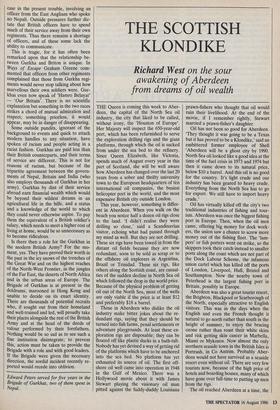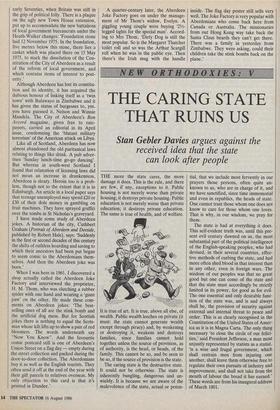THE SCOTTISH KLONDIKE
Richard West on the sour
awakening of Aberdeen from dreams of oil wealth
THE Queen is coming this week to Aber- deen, the capital of the North Sea oil industry, the city that liked to be called, without irony, the 'Houston of Europe'. Her Majesty will inspect the 650-year-old port, which has been refurnished to serve the exploration drilling rigs and the giant platforms, through which the oil is sucked from under the sea bed to the refinery. Since Queen Elizabeth, like Victoria, spends much of August every year in this part of Scotland, she will be well aware how Aberdeen has changed over the last 20 years from a sober and thrifty university town to the European headquarters of ten international oil companies, the busiest helicopter port in the world, and the most expensive British city outside London. This year, however, something is differ- ent in Aberdeen. When you walk on the beach you notice half a dozen oil rigs close to the land. 'I didn't realise they were drilling so close,' said a Scandinavian visitor, echoing what had passed through my mind as well. But they are not drilling. These six rigs have been towed in from the distant oil fields because they are now redundant, soon to be sold as scrap or to the offshore oil explorers in Argentina, Brazil or Trinidad. These six rigs, like others along the Scottish coast, are casual- ties of the sudden decline in North Sea oil which followed the drop in the world price. Because of the physical problem of getting oil out of the North Sea, most of the wells are only viable if the price is at least $12 and preferably $18 a barrel.
Those in Aberdeen who dislike the oil industry make bitter jokes about the re- dundant rigs, saying that they should be turned into fish farms, penal settlements or adventure playgrounds. At least these ex- ploration rigs are disposable; they can be floated off like plastic ducks in a bath-tub. Nobody has yet devised a way of getting rid of the platforms which have to be anchored into the sea bed. No platform has yet exhausted its source of oil. The first off- shore oil well came into operation in 1948 in the Gulf of Mexico. There was a Hollywood movie about it with James Stewart playing the visionary oil man pitted against the fuddy-duddy Louisiana prawn-fishers who thought that oil would ruin their livelihood. At the end of the movie, if I remember rightly, Stewart married a prawn-fisher's daughter.
Oil has not been so good for Aberdeen. 'They thought it was going to be a Texas but it has proved to be a Klondike,' said an embittered former employee of Shell 'Aberdeen will be a ghost city by 1990. North Sea oil looked like a good idea at the time of the fuel crisis in 1973 and 1974 but then it came down to its natural price, below $10 a barrel. And this oil is no good for the country. It's light crude and our industry has been geared to heavy crude. Everything from the North Sea has to go for export. We still have to import heavy crude.'
Oil has virtually killed off the city's two traditional industries of fishing and tour- ism. Aberdeen was once the biggest fishing port in Europe. Then, when the oil men came, offering big money for dock work- ers, the union saw a chance to screw more money out of the fishing fleet. The `lum- pers' or fish porters went on strike, so the skippers took their catch instead to smaller ports along the coast which are not part of the Dock Labour Scheme, the infamous union cartel which has killed off the ports of London, Liverpool, Hull, Bristol and Southampton. Now the nearby town of Peterhead is the largest fishing port in Britain, possibly in Europe.
Aberdeen was also a great tourist resort, the Brighton, Blackpool or Scarborough of the North, especially attractive to English visitors. This was in the days when the English and even the French thought it natural to go north rather than south in the height of summer, to enjoy the bracing ozone rather than roast their white skins and risk getting skin cancer in Marbella, Miami or Mykonos. Now almost the only northern seaside town in the British Isles is Portrush, in Co Antrim. Probably Aber- deen would not have survived as a seaside resort even without oil. There are very few tourists now, because of the high price of hotels and boarding houses, many of which have gone over full-time to putting up men from the rigs.
The oil reached Aberdeen at a time, the early Seventies, when Britain was still in the grip of political folly. There is a plaque on the ugly new Town House extension, put up to accommodate the new battalions of local government bureaucrats under the Heath-Walker changes: 'Foundation stone laid 12 November 1975. In the foundation, five metres below this stone, there lies a casket which was placed there on 15 May 1975, to mark the dissolution of the Con- stitution of the City of Aberdeen as a result of the reform of local government, and which contains items of interest to post- erity.'
Although Aberdeen has lost its constitu- tion and its identity, it has acquired the dubious honour of linking itself as a 'twin town' with Bulawayo in Zimbabwe and it has given the status of burgesses to, yes. you have guessed it, Nelson and Winnie Mandela. The City of Aberdeen's Bon Accord magazine, given free to rate- payers, carried an editorial in its April issue, condemning the 'blatant military terrorism' of the American attack on Libya.
Like all of Scotland, Aberdeen has now almost abandoned the old puritanical laws relating to things like drink. A pub adver- tises 'Sunday lunch-time go-go dancing'. But whereas in south-west Scotland I found that relaxation of licensing laws did not mean an increase in drunkenness, Aberdeen is sleazy. Heroin too is a prob- lem, though not to the extent that it is in Edinburgh. An article in a local paper says that teenage unemployed may spend £20 or £30 of their dole money in gambling on fruit machines. They have sprayed graffiti over the tombs in St Nicholas's graveyard.
I have made some study of Aberdeen jokes. A historian of the city, Cuthbert Graham (Portrait of Aberdeen and Deeside, published by Robert Hale), says: 'Suddenly in the first or second decades of this century the shifts of ruthless hoarding and saving to which their ancestors had been put began to seem comic to the Aberdonians them- selves. And then the Aberdeen joke was born.'
When I was here in 1961, I discovered a shop actually called the Aberdeen Joke Factory and interviewed the proprietor, H. M. Thom, who was clutching a rubber spider with one hand and wearing a 'giant paw' on the other. He made these com- ments on Aberdeen jokes: 'The best- selling ones of all are the stink bomb and the artificial dog mess. But for Scottish jokes there is nothing to equal the Scots- man whose kilt lifts up to show a pair of red bloomers. The words underneath say "Now You Know". And the favourite comic postcard still is one of Aberdeen's Union Street on a flag day — empty during the street collection and packed during the door-to-door collection. The Aberdonians buy it as well as the English tourists. They often send it off at the end of the year with their gift parcels to relatives overseas. My only objection to this card is that it's printed in Dundee.' A quarter-century later, the Aberdeen Joke Factory goes on under the manage- ment of Mr Thom's widow, Evelyn. A giggling young couple were buying '2½- legged tights for the special man'. Accord- ing to Mrs Thom, 'Dirty Dog is still the most popular. So is the Margaret Thatcher toilet roll and so was the Arthur Scargill roll when he was in the public eye. Then there's the Irish mug with the handle inside. The flag day poster still sells very well. The Joke Factory is very popular with Aberdonians who come back here from Canada or Australia. The missionaries from out Hong Kong way take back the Santa Claus beards they can't get there. There was a family in yesterday from Zimbabwe. They were asking, could their children take the stink bombs back on the plane.'











































 Previous page
Previous page